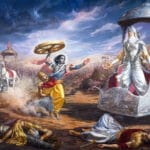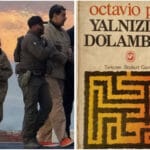This question can also be phrased as follows: Why is it that whenever an Islamic movement or a political group referring to Islam comes to power in any country in the Islamic world, news agencies and newspapers are filled with headlines like, “Sharia declared in Afghanistan: Women are banned from going out, and men are prohibited from shaving their beards,” “Chechnya adopts a Sharia-based constitution: A woman accused of adultery was stoned, and someone caught stealing was sentenced to bastinado,” or “Islamic constitution in Pakistan: Thieves’ hands will be cut off”?
Similar situations also apply when religious Jews or Christians raise their voices and make various demands. For example, in Israel, “Radical religious Jews protested such and such a meeting held on Saturday”, or “The Pope lifted the ban on discussing the theory of evolution”.
Why is the image that Abrahamic religions present to eight billion people in today’s world always equated with prohibitions and oppression? So much so that even voluntary or natural members of these religions do not approve of the interpreters of their religions who produce such images, and these interpreters always remain a “minority and fanatic group”.
As the rate of Islamic awareness increases in Türkiye, wyh does dismay and fear prevail in a wide segment of society? Why does the majority of the society view with strange suspicion and distance themselves from people who think and live by embracing Islam?
The question “Is religion a tool or an end?” essentially enables us to question why the thoughts and policies that are the product of answering this question, “it is a goal,” produce images that make us ask the questions above.
Generally, the devout, who are the “steadfast believers”, that is, religiouses of divine religions, particularly that of religion of Islam, share a common perspective that religion should shape and control all aspects of life and humanity. This perspective, which perceives religious rules as immutable and indisputable due to their divine origin, advocates that all human problems will be resolved with the dominance of these rules, and therefore, establishing the dominance of religion is the fundamental duty of every believer.
However, whether this approach is inherently desired by religion(s) themselves is debatable. Because new questions and uncertainties arise, such as which interpretation of religious rules will be dominant and how. Jews and Christians have partially overcome this ambiguity due to the existence of a clerical class. However, this uncertainty is valid for Muslims; which interpretation of Islam is the only correct one according to whom? What will happen to those who do not approve of this one true interpretation? This approach essentially leads to the conclusion that the interpretation held by those in power becomes the only correct one. Thus, throughout Islamic history, the interpretations of Islam aligned with those in power have prevailed. Similarly, rulers have supported interpretations they found favorable. As a result, the rhetoric of establishing religious dominance has increasingly become a means for followers of a particular interpretation to achieve political power. Debates on the caliphate during the Umayyads, the Mutazilite-centered disputes during the Abbasids, and the conflicts between Sunni-Hanafi interpretations and Safavid Shiism or Batini interpretations during the Ottoman period were precisely manifestations of this struggle for power.
What, then, is the meaning of religion in the contemporary world? Given that Islam, unlike Judaism and Christianity, has not retreated from life or relinquished its worldly claims, and rather, provides principles and rules for every aspect of life based on its beliefs and decrees, how will Islam’s issue of dominance be resolved in the modern world? In other words, how will the followers of this religion experience hope, peace, and security instead of fear and anxiety in the face of Islam’s dominance?
We believe this problem can be resolved by removing Islam and Islamic rules from being an end in themselves and adopting an approach proposed by the Andalusian scholar Al-Shatibi, which involves identifying the purposes of these rules through the framework of “Maqasid al-Sharia” (the objectives of Sharia).
This means that God, who created and honored human beings and entrusted them with responsibility, subjects us to a test of making the right choice in the conflict between evil, represented by Satan (Şerr, that is, harmful), and divinely inspired goodness (hayr, that is, useful). This test is an opportunity and possibility for humans to achieve true and eternal existence through goodness in a mortal and limited earthly life that includes evil at the same time with goodness. To this end, Allah has sent prophets to guide humanity with revelation, distinguishing right from wrong (furqan), choosing what is right and good (hidayah), staying on the right path (guidance), and avoiding evil (admonition). The purpose of revelation is to encourage people to choose justice and goodness, remind them of what they have forgotten, keep them away from evil and oppression, and ensure they live their test of life as Allah desires and return to Him (ilayhi raji’un). The word of God is religion, not in itself, but in the sense of the way it shows and defines. In the Qur’an, the term “shari’a” (defining the path) is mentioned five times, “religion” (the content of the path) 85 times, and “Islam” (entering and adhering to the path) 161 times. These words themselves do not express a purpose; they offer to the people the “way” of ensuring the sovereignty of tawhid, justice, goodness, morality and peace as a purpose. However, over time, this main path and purpose was replaced by the “Book” itself, which is a guide (showing the right path), furqan (separating right from wrong), guidance and advice (that is, a tool) to reach the real purpose on this path. The institutionalized set of rules that perceived as “religion” itself has become the “purpose” to defend and establish dominance. Islam, the Prophet, and the Qur’an show a way to people, but instead of following this path, people consider adherence to the “pointing finger” as religiosity.
For instance, while the Qur’an states, “When you judge, judge with justice,” some interpreters advocate “ruling with the Qur’an.” That is, “following the Qur’an” has become a psychological expression perceived as an end in itself, detached from its content. However, prioritizing justice and goodness and preventing evil and oppression is already, in the broadest sense, adhering to the Qur’an. Muslims, instead of reflecting on questions such as “How do we judge with justice, how do we prioritize goodness, how do we identify what is right and beautiful?” and striving to find diverse and well-founded answers to these questions under current conditions, prefer to merely talk about (or impose) “establishing the rule of the Qur’an” or “judging by what Allah has revealed.” For example, in discussions on governance and law, this issue becomes evident. The early Muslims conducted these discussions with a more relaxed psychology and did not perceive them as matters of creed, while today, debates on democracy or law are carried out with the anxiety of “religion must not perish” and through doctrinal concepts like faith, disbelief, and polytheism. Yet, discussions centered on state and governance have never been approached in this manner by any school of thought (except the Kharijites) in Islamic history. During the time of Khalif Omar, the “Divan” tradition of the Sassanids was adopted as the council model called “Ehli Hal ve’l Akd” and no one accused his choice as blasphemy. Likewise, during the fight between Khalif Ali and Muawiyah, the parties did not blame each other with creedal concepts, but a discussion was carried out in the political sense around the concepts of justice and oppression. The fact is that most of the rules and principles considered today as part of the Sharia system are products of the Arab Islamic practices during the Umayyad period and represent a form of practical Arab Islamic interpretation. Similarly, many interpretations and practices of Ottoman or Iranian origin should be understood as practices produced by Muslims under different conditions in line with the purposes of Islam.
Due to the conception produced by replacement of purpose and means, Muslims have adopted a “manufactured behavior” such as finding answers to all their questions from their religion, expecting from the religion to solve all their questions, and imposing this on people.
Is God or Man the Subject of Religion?
Here, the question of “the subject and owner of religion” arises. The owner of religion is God and its subject, that is, its main object and problem, is the human. However, in contemporary interpretations developing under the umbrella of Islamic thought, this has been reversed: Muslims have become the owners of religion, and God has been made its subject. As a result, Muslims have become people who “fight for religion”, act in the name of religion, try to keep and protect religion, and try to organize life based on religion. However, religion belongs to Allah, and by Allah Muslims are not tasked of protecting and of keeping it alive.. It is Allah who will protect the religion and keep it alive until the doomsday. Muslims are only members of the religion (the path). By following that path, they make a choice that will be beneficial for them in this world and the hereafter and try to solve their problems in favor of goodness and justice. Since the path itself is not a purpose and the path belongs to Allah, the duty of Muslims is only to walk on this path and try not to deviate.
In this context, Islam’s subject is the human, and it centers on the human. It looks at events from the human perspective and is based on the worldly and otherworldly salvation and happiness of the human. However, in the minds of Muslims, this position has been changed, the subject has become “Allah” and the human have been brought into confrontation with God. So much so that a division between the divine and the human has been made, placing everything produced by humanity in opposition to the “divine.”
This perspective fosters a tendency to belittle and distrust humanity, setting God against human as if in competition. This false understanding of religion, God and man is the source of some debates that pit “Islam” against some ideologies (socialism, nationalism, liberalism), pit the sovereignty of Islam against the sovereignty of God, and pit revelation against the reason.
In the Qur’anic verses about creation, the conflict occurs between the human and the satan, with God siding with the human as the most honorable creation, while the satan degrades the human for being created from clay and refuses to bow to the human. For this reason, the devil was expelled, but was given respite as a “test” to prove his claim that he was superior to the human.
It is satan who belittles the human, tries to put the human aganist God, distrusts the human, and feels discomfort at human’s existence. God, on the other hand, is the one who created and honored human, defended him, trusted him, and made him superior to other creations.
Despite this obvious concept of existence, the stance of the people who claim to struggle to read and implement the Quran and make the opposite interpretation of “contradiction and struggle” can only be explained by sociological, political and psychological reasons. But this attitude cannot be legitimized by the Qur’an.
The subject of religion is man, and man’s counterpart is not God but satan (evil). Human existence, it is interpreted as purification (berae) from the devil (evil) and an effort to be free from evil by choosing in favor of justice, goodness and peace coming from the divine spirit. The test is given within this effort of liberation (Tawhid – La ilahe illallah).
This human-centered perspective and this style of interpretation, which places human-Allah and religion in their place by making the ownership of religion unique to God, has a detailed and practical testimony (example) with the entire life of the Prophet (pbuh). As the “walking Qur’an”, the Messenger of Allah is a teacher from whom one can learn the effort to walk on the path recommended by Allah and the meaning of “life” itself. “Allah, the Compassionate and Merciful”, has shown to the human through the lives of His prophets, the struggle of making goodness and justice dominant, keeping justice and goodness superior, and overcoming evil and oppression by putting the human at the center. Thus, when the Messenger of Allah made Medina his home—when Islam/Sharia was proclaimed in Medina—none but the oppressors felt fear, and the people of Medina, whether Muslim or not, welcomed the Prophet with excitement and joy, saying that “peace, tranquility, justice, and goodness” were coming to Medina.
In the contemporary world, Muslims should try to understand their religion as a way of true “mercy and prosperity” by purifying them from interpretations that turn their religion into “a dungeon and trouble for themselves and for humanity”. The way to do this is to first consider religion as a “way” that will not be a goal and only serve the real purpose, that is, as a “way” that will make the human an honorable creature, that will truly humanize the human by defeating evil, and that will remove evil from the human, and then show the concrete examples of how problems can be solved by focusing on the human, trusting the human, and ensuring that the mind works correctly.
Religion, otherwise, will remain a “dangerous weapon of power” that uses the name of God, associates itself with “laws and prohibitions,” fails to understand and explain the lived experience, seeks to impose the practical rules and principles of the agricultural society era in the information age, and can turn a blind eye to injustices committed in the name of God.
Yes, Islam has laid out principles and values that address all aspects of life. However, understanding and applying these principles to serve justice, goodness, and freedom is what it truly means to follow Islam, be devout, and earn God’s pleasure. Unfortunately, the name of imposing these principles and values on humanity by misinterpreting them for sociological, psychological or political reasons is not being religious, being a better Muslim, or making Islam/Allah dominant, but simply oppressing in the name of Allah. And unfortunately, the Islamic world is full of examples that are the product of this logic. Therefore, a political or social project should become feasible or debatable to the extent that it complies with the aims of Islam such as goodness, justice, peace and freedom from the perspective of a Muslim mind. In other words, the criterion should not be to produce a project based on Islam, but to produce ideas and practices that are in line with the purposes of the principles and values of Islam (at least not openly contrary to these values) based on practical life. Those who will determine and decide this are scholars with diverse interpretations and methodologies. It is the people (society or nation) who will approve or reject it. In this sense, “ijma-i ummah”, that is, “common verdict”, can be defined not as an consensus of religious scholars as a rule of fiqh, but as a political philosophy, in which the society gives weight to one of various views and interpretations with its free will.
In the contemporary world, the way for Islam and Muslims to produce political, economic and social ideas and projects that will set an example for all humanity is, first of all, by reconstituting the concepts of religion, God and the human on a libertarian basis, by purifying them from the effects of the interpretations made by the rulers of the agrarian ages. Muslim politicians and intellectuals living in a modernized and developed Türkiye, which possesses the heritage of Islamic civilization, are better equipped to realize this potential than the following: Iranian Shi’ism, which resembles Catholicism and perpetuates a historical conflict with the Sunni Islamic world; the Salafi Arab/Islamic world, which is a product of the Bedouin Arab mindset; the anti-Hinduism of Pakistani theologians, a product of British imperialism’s divide-and-rule policies in India; or the Islamic perspectives of Afghanistan, Sudan, and Algeria, which are still intertwined with their agricultural societies and political conflicts.
Religion, in the final analysis, is a tool for becoming truly human. By purifying himself from the control of his evil-inclined human side, man enters the path shown by God, that is, the path of goodness and justice, thanks to religion. This path, of course, is not easy, it is a difficult path that is hard on the human soul and requires constant control of human instincts and reflexes. However, there is no other way to be human, to be Adam-man. Living a moral life, without forgetting that the worldly life is temporary and the hereafter is eternal, and with the understanding that this effort makes people mature, is easier than turning one’s back to oneself, others and to whom God’s wish mercy for, and oppressing.
When the human forget their consciousness of existence and purpose of living, or when they do not have a purpose that is valid for all humans, they become cruel, and an instinct for brutality and destruction that is not found in any other living creature emerges in the human. Wars, oppression, torture, exploitation, lies, corruption, theft and other evils are the product of forgetting the consciousness of Allah and leave aside being Adam. Love and fear of God, understanding and responsibility of being Adam are the only ways to tame these wild sides of the human. Throughout history, thanks to these divine messages, humanity has achieved a civilized order, and the periods of domination of abusive, exploitative ruling classes, including the abuse of these messages, have brought blood and tears. Even though people’s material civilization level increases, when man loses his consciousness of God and Adam, refined forms of subservience of man become dominant at this level of civilization. In this sense, religion is a guide to being the human, that shows, reminds and teaches the path of goodness and justice for all people, despite all kinds of lifestyle and sociological differences.
The transformation of religions over time into parts of the status quo, institutionalized foundations of conservative culture that freeze lived life, and sources of internal tension and political conflict instead of human peace and happiness are deviations frequently observed in history.
Therefore, the awareness that religion is a tool for the effort to become the human and that its owner is solely God, will prevent both the exploitation of religion and its institutionalization into superhuman forces that contradict its true objectives.
In this context, it is essential to develop a libertarian understanding of religion that emphasizes its essence and true purpose, eliminating all forms of exploitation, oppression, servitude, and discord among people.
In this sense, Tawhid expresses the essence of the consciousness necessary to overcome the capitalist world in which humanity is drowning, to establish another world in which people can live humanely, and to overcome the evil. The motto “There is no god but Allah” means abandoning all kinds of superhuman, degrading, anti-human and human-destroying thoughts and behaviors. The rejection of servitude to anyone except Allah will result in a just state, an economy based on justice and equality, and a dynamic culture based on a liberating worldview. All differences, ethnic, religious, sectarian and philosophical differences of people will cease to be causes of conflict only thanks to the consciousness of monotheism, and differences can be transformed into natural human riches with the understanding of the existence of a single human substance and a single creator. Instead of capitalist competition and social Darwinist selection mechanisms (where the strongest survive), the dynamics of competition and solidarity in charity will come to the fore.
Islam is the only path for humanity to achieve true humanness—that is, for individuals to mature as honorable beings, to preserve the level of maturity they have attained, and to assist their fellow human brothers and sisters in this struggle. It ensures that the state and all forms of authority cannot restrict human freedom, that the economy and culture cannot enslave people, and that superstition, myths, falsehoods, and misinformation cannot dull the human intellect. Because the essence and purpose of religion is ‘La ilahe illallah’, that is, there is no god but Allah. The rest is the interpretation of this maxim.










